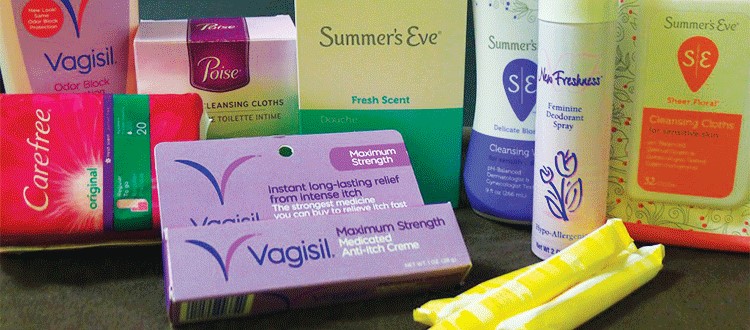I was always told as a young girl to make sure I washed “my privates” when bathing. To be clear, and to also use the proper anatomical terms, this means cleaning my vulvar tissue.
A woman’s vulva is the externally visualized skin tissue between your legs and between pubic bone and anus. The vulvar tissue includes mons pubis, labia majora, labia minora, hymen, clitoris, vaginal vestibule, urethra, Skene’s glands, and Bartholin’s glands. Contrary to what many people believe, this area of the female body is self-cleansing and doesn’t need to be “cleaned.” Instead of being told to clean the area with just water and not to rub the tissue, we are bombarded by many products and advertisements telling us the complete opposite.

There are many products on the market that claim to do great things for your vulvar tissue. However, many of them tend to disrupt the natural skin barrier that can result in stinging and burning. The list that follows is not comprehensive, but gives you an idea of what can cause irritation.
- Body Fluids: sweat, semen, urine, feces, vaginal discharge
- Feminine Hygiene Products: feminine wipes, douches, sanitary pads, panty liners, tampons, deodorants, lotions, powders, perfumes
- Laundry detergent, bleach, or fabric softeners
- Cleansing Products: soap, bubble baths, salts, shampoo, conditioner, perfumed toilet paper
- Physical Irritants: tight fitting clothing, nylon underwear, synthetic undergarments, latex, sponges, excessive washing, vigorous drying, etc.
- Topicals: Benzocaine, Neomycin, Chlorhexidine (in K-Y Jelly), Imidazole antifungal, propylene glycol, tea tree oil, preservatives
[Adapted from The V Book, by Elizabeth G. Stewart, M.D., and Paula Spencer (Bantam Books, 2002), and Proceedings in Obstetrics and Gynecology, 2014; 4(2):1]
If you struggle with vulvodynia, the above list is something to pay attention to. Not only can this angry tissue cause pain and discomfort, it is indicative of a skin barrier impairment that can make you more susceptible to yeast infections and symptoms consistent with urinary tract infections.
What else can you do to calm down irritated tissue?
- Wear loose clothing – tight fitting clothing can increase friction and exacerbate irritation and redness
- Wear all cotton underwear and go without underwear when at home – If you don’t wear underwear with yoga pants, use an all-cotton liner so only cotton is touching vulvar tissue
- Avoid wearing waisted pantyhose and instead wear thigh high or knee high
- After swimming, remove wet bathing suit and shower to remove chlorine – avoid hot tubs and heavily chlorinated pools
- Avoid exercises that cause more irritation like cycling, horse-back riding, and spin classes (this is more for when your tissue is already irritated)
- Use hypoallergenic laundry detergent – try a detergent used for babies
- Avoid use of a washcloth or sponge for cleansing the area; instead use just water and your own fingers –
– If you feel you must use a cleanser, use an unscented and non-alkaline cleanser (i.e. Cetaphil, Dove or Neutrogena for sensitive skin)
– Avoid rubbing the vulva
– Soak for five minutes in lukewarm water to remove residue of sweat and any other products
– Always pat the area dry (avoid rubbing)
- Drink plenty of water! Diluted urine will cause much less irritation to vulvar tissue than concentrated and more acidic urine
- Avoid moisturizing vaginal wipes and instead opt for a spray bottle of plain water if you feel like you need more moisture. Then, pat dry – you can also try a spray bottle of extra virgin olive oil and pat dry
- During (penetrative) intercourse, be sure to use a lubricant without additive or preservatives (see separate blog on lubricants)
– Rinse the vulva with water after intercourse
– Use a gel pack wrapped in a towel after intercourse to calm irritation
Another resource for you to take a look at is the use of a menstrual cup in place of tampons and pads. The following is a link with a quiz to help you determine which cup could work you: https://putacupinit.com
If this all seem too much or you want more details, one of our expert therapists can help customize a treamtment program to get you feeling better, faster.
Our blog series on vulvar tissue will continue next week with a final entry based on the importance of vulvar skin checks.

